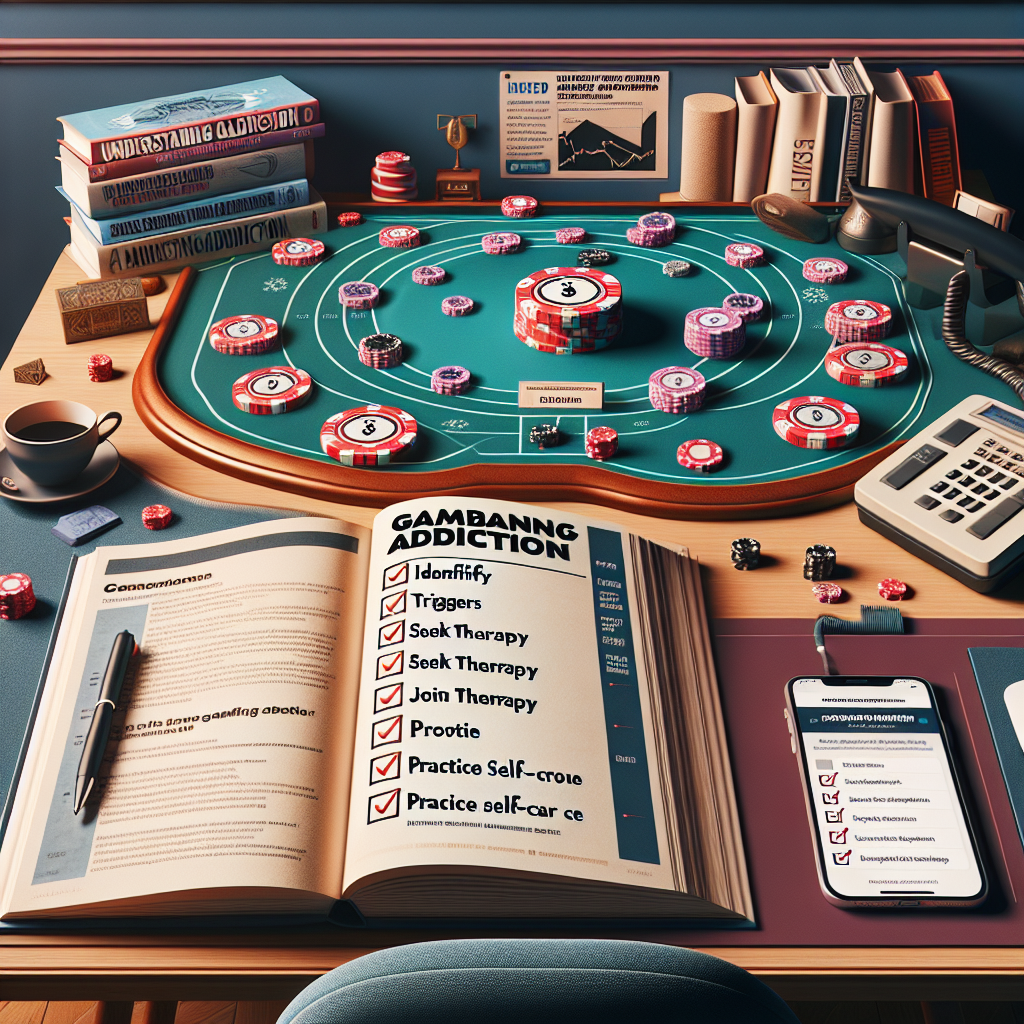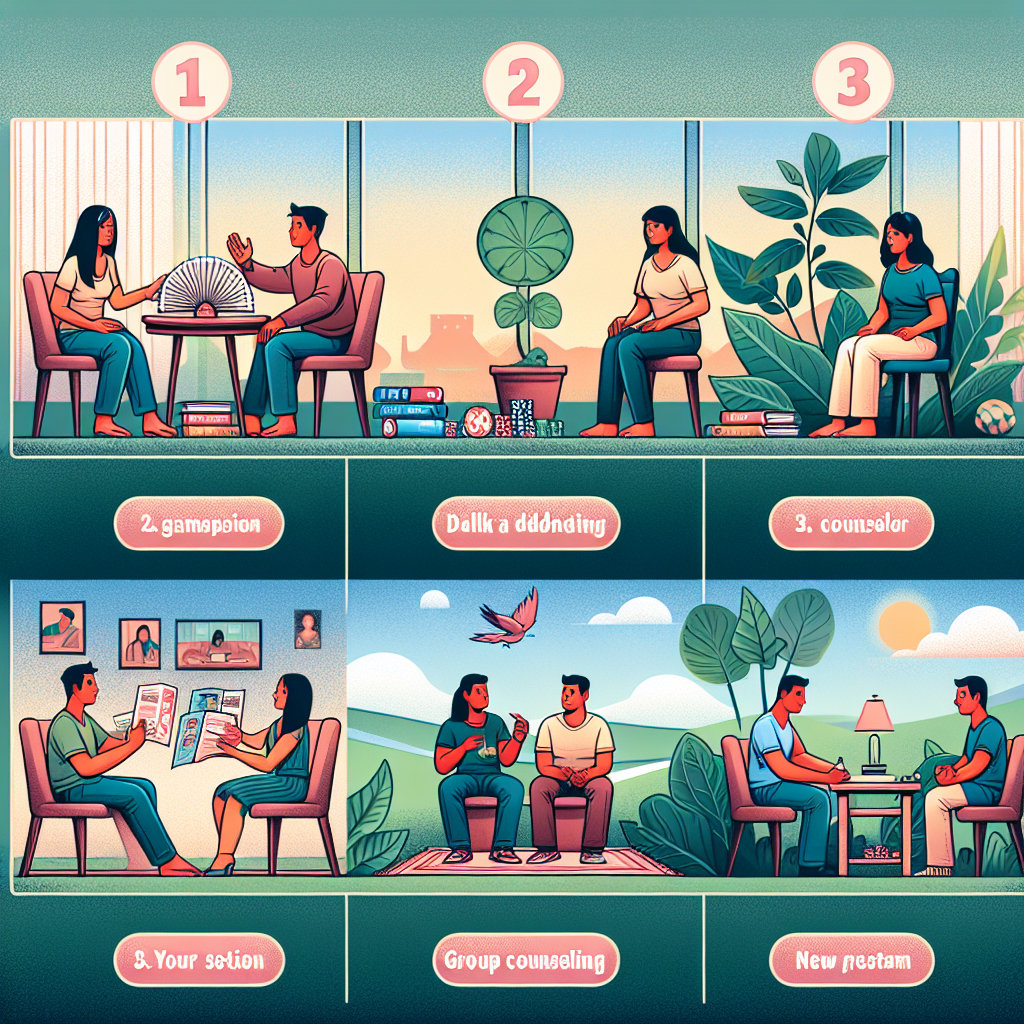-
Table of Contents

“Recognize, Reach Out, Reclaim: Your Path to Overcoming Gambling Addiction”
Introduction
Gambling addiction, also known as compulsive gambling or gambling disorder, is a serious condition that can have devastating effects on an individual’s financial stability, relationships, and overall well-being. Recognizing the signs of a gambling problem early and taking immediate action is crucial for recovery. The first steps to take when you suspect a gambling addiction involve acknowledging the problem, seeking professional help, and building a support system. By understanding these initial steps, individuals can begin the journey towards regaining control over their lives and achieving long-term recovery.
Recognizing the Warning Signs: The First Steps to Take When You Suspect a Gambling Addiction
Recognizing the warning signs of a gambling addiction is the crucial first step toward reclaiming control over one’s life. When you suspect that you or someone you care about may be struggling with this issue, it is essential to act promptly and thoughtfully. The journey to recovery begins with awareness, and understanding the indicators of a gambling problem can make all the difference.
Initially, it is important to observe behavioral changes that may signal a gambling addiction. These can include an increasing preoccupation with gambling activities, such as spending excessive time thinking about past gambling experiences, planning the next venture, or devising ways to obtain money for gambling. Additionally, individuals may start to gamble with larger amounts of money to achieve the same level of excitement, a phenomenon known as tolerance. This escalation often leads to financial difficulties, which can manifest as borrowing money, selling possessions, or even resorting to illegal activities to fund the habit.
Moreover, emotional and psychological signs are equally telling. Feelings of restlessness or irritability when attempting to cut down or stop gambling are common. This withdrawal can be accompanied by anxiety, depression, or even suicidal thoughts, especially if the individual feels trapped by their circumstances. Social withdrawal is another red flag; those struggling with gambling addiction may isolate themselves from family and friends, neglecting relationships and responsibilities in favor of gambling.
Once these warning signs are recognized, the next step is to seek help. It is vital to approach this process with compassion and understanding, whether you are addressing your own behavior or that of a loved one. Open and honest communication is key. Express your concerns without judgment, focusing on specific behaviors and their impact rather than making accusatory statements. This can help create a supportive environment where the individual feels safe to acknowledge their problem.
Professional assistance is often necessary to effectively address gambling addiction. Consulting a healthcare provider can provide a comprehensive evaluation and guide you toward appropriate treatment options. Cognitive-behavioral therapy (CBT) is a common and effective approach, helping individuals to identify and change unhealthy thought patterns and behaviors related to gambling. Additionally, support groups such as Gamblers Anonymous offer a community of individuals who share similar experiences, providing mutual support and encouragement.
In parallel with professional help, practical steps can be taken to mitigate the immediate risks associated with gambling. Setting financial boundaries is crucial; this might involve limiting access to money, such as handing over control of finances to a trusted person or setting up automatic payments for bills to prevent funds from being used for gambling. Self-exclusion programs, which allow individuals to ban themselves from gambling venues and online platforms, can also be a valuable tool in reducing temptation.
Furthermore, fostering a balanced lifestyle can aid in recovery. Engaging in alternative activities that provide fulfillment and joy, such as hobbies, exercise, or volunteering, can help redirect focus away from gambling. Building a strong support network of friends and family who understand the challenges and are willing to offer encouragement can also be instrumental in maintaining progress.
Ultimately, recognizing the warning signs of a gambling addiction and taking the first steps toward addressing it requires courage and determination. By acknowledging the problem, seeking professional help, and implementing practical strategies, individuals can begin the journey toward recovery and reclaim a life free from the grip of gambling addiction. The path may be challenging, but with perseverance and support, it is possible to overcome and thrive.
Seeking Help and Support: Initial Actions for Addressing a Gambling Addiction
When you first suspect that you or someone you care about may be struggling with a gambling addiction, it can be an overwhelming and daunting realization. However, acknowledging the problem is the crucial first step towards recovery. It’s important to understand that gambling addiction is a serious issue, but with the right support and resources, it is possible to regain control and lead a healthier, more fulfilling life.
The initial action to take when you suspect a gambling addiction is to educate yourself about the condition. Understanding the signs and symptoms of gambling addiction can help you recognize the problem more clearly. Common indicators include an inability to stop gambling, lying about gambling activities, and experiencing financial difficulties as a result of gambling. By becoming informed, you can better comprehend the challenges ahead and prepare yourself for the journey towards recovery.
Once you have a clearer understanding of the addiction, the next step is to reach out for help. This can be a difficult and emotional process, but it is essential. Start by confiding in someone you trust, whether it be a family member, friend, or counselor. Sharing your concerns can provide a sense of relief and open the door to support and guidance. Additionally, seeking professional help from a therapist or counselor who specializes in gambling addiction can be incredibly beneficial. These professionals can offer personalized strategies and coping mechanisms to help manage the addiction.
In conjunction with seeking professional help, consider joining a support group. Support groups, such as Gamblers Anonymous, provide a safe and non-judgmental environment where individuals can share their experiences and offer mutual support. Being part of a community of people who understand what you are going through can be incredibly empowering and can help reduce feelings of isolation and shame.
Another important step is to take practical measures to limit access to gambling opportunities. This might involve self-exclusion programs, which allow individuals to ban themselves from gambling establishments and online gambling sites. Additionally, consider implementing financial safeguards, such as having a trusted person manage your finances or setting up automatic payments for bills to prevent the temptation to use money for gambling.
As you navigate the path to recovery, it is crucial to focus on building a balanced and fulfilling life. Engage in activities that bring you joy and satisfaction, whether it be hobbies, exercise, or spending time with loved ones. Developing healthy routines and finding new sources of fulfillment can help reduce the urge to gamble and provide a sense of purpose.
Throughout this journey, it is important to practice self-compassion and patience. Recovery from gambling addiction is not a linear process, and there may be setbacks along the way. However, each step forward, no matter how small, is a victory. Celebrate your progress and remind yourself that seeking help is a courageous and commendable act.
In conclusion, when you suspect a gambling addiction, taking the first steps towards seeking help and support is vital. Educate yourself about the condition, reach out to trusted individuals, seek professional and community support, implement practical measures to limit gambling opportunities, and focus on building a balanced life. Remember that recovery is possible, and with determination and support, you can overcome the challenges and reclaim control over your life.
Q&A
1. **Question:** What is the first step to take when you suspect you have a gambling addiction?
**Answer:** The first step is to acknowledge the problem and recognize the signs of gambling addiction, such as spending more money and time on gambling than intended, and experiencing negative impacts on personal and professional life.
2. **Question:** What should you do after acknowledging a gambling addiction?
**Answer:** After acknowledging the addiction, seek professional help by contacting a mental health professional, counselor, or a support group like Gamblers Anonymous to get the necessary support and treatment.
Conclusion
When suspecting a gambling addiction, the first steps to take include acknowledging the problem, seeking professional help, and building a support system. Acknowledging the issue is crucial for initiating change. Consulting with healthcare professionals, such as therapists or counselors specializing in addiction, can provide tailored strategies and interventions. Additionally, involving family and friends can offer emotional support and accountability. These initial actions are essential for addressing the addiction and paving the way for recovery.



